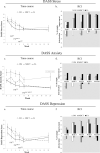The contributions of focused attention and open monitoring in mindfulness-based cognitive therapy for affective disturbances: A 3-armed randomized dismantling trial
- PMID: 33434227
- PMCID: PMC7802967
- DOI: 10.1371/journal.pone.0244838
The contributions of focused attention and open monitoring in mindfulness-based cognitive therapy for affective disturbances: A 3-armed randomized dismantling trial
Abstract
Objective: Mindfulness-based cognitive therapy (MBCT) includes a combination of focused attention (FA) and open monitoring (OM) meditation practices. The aim of this study was to assess both short- and long-term between- and within-group differences in affective disturbance among FA, OM and their combination (MBCT) in the context of a randomized controlled trial.
Method: One hundred and four participants with mild to severe depression and anxiety were randomized into one of three 8-week interventions: MBCT (n = 32), FA (n = 36) and OM (n = 36). Outcome measures included the Inventory of Depressive Symptomatology (IDS), and the Depression Anxiety Stress Scales (DASS). Mixed effects regression models were used to assess differential treatment effects during treatment, post-treatment (8 weeks) and long-term (20 weeks). The Reliable Change Index (RCI) was used to translate statistical findings into clinically meaningful improvements or deteriorations.
Results: All treatments demonstrated medium to large improvements (ds = 0.42-1.65) for almost all outcomes. While all treatments were largely comparable in their effects at post-treatment (week 8), the treatments showed meaningful differences in rapidity of response and pattern of deteriorations. FA showed the fastest rate of improvement and the fewest deteriorations on stress, anxiety and depression during treatment, but a loss of treatment-related gains and lasting deteriorations in depression at week 20. OM showed the slowest rate of improvement and lost treatment-related gains for anxiety, resulting in higher anxiety in OM at week 20 than MBCT (d = 0.40) and FA (d = 0.36), though these differences did not reach statistical significance after correcting for multiple comparisons (p's = .06). MBCT and OM showed deteriorations in stress, anxiety and depression at multiple timepoints during treatment, with lasting deteriorations in stress and depression. MBCT showed the most favorable pattern for long-term treatment of depression.
Conclusions: FA, OM and MBCT show different patterns of response for different dimensions of affective disturbance.
Trial registration: This trial is registered at (v NCT01831362); www.clinicaltrials.gov.
Conflict of interest statement
The authors have read the journal’s policy and have the following competing interests: WBB is a MBSR and MBCT teacher and has received financial compensation for this role, and is also nominally affiliated with the Mindfulness Center at Brown University which generates income by offering mindfulness classes to the public. WBB is the founder of Cheetah House, a RI non-profit organization that provides information about meditation-related difficulties, individual consultations, and support groups, as well as educational trainings to meditation teachers, clinicians, educators and mindfulness providers. This interest has been disclosed to and is being managed by Brown University, in accordance with its Conflict of Interest and Conflict of Commitment policies. This does not alter our adherence to PLOS ONE policies on sharing data and materials.
Figures




Similar articles
-
Low-Intensity Guided Help Through Mindfulness (LIGHTMIND): study protocol for a randomised controlled trial comparing supported mindfulness-based cognitive therapy self-help to supported cognitive behavioural therapy self-help for adults experiencing depression.Trials. 2020 May 4;21(1):374. doi: 10.1186/s13063-020-04322-1. Trials. 2020. PMID: 32366320 Free PMC article.
-
Effectiveness of mindfulness-based cognitive therapy for comorbid depression and anxiety in pregnancy: a randomized controlled trial.Arch Womens Ment Health. 2020 Apr;23(2):207-214. doi: 10.1007/s00737-019-00962-8. Epub 2019 Apr 13. Arch Womens Ment Health. 2020. PMID: 30982086 Clinical Trial.
-
Effects of group mindfulness-based cognitive therapy and group cognitive behavioural therapy on symptomatic generalized anxiety disorder: a randomized controlled noninferiority trial.BMC Psychiatry. 2022 Jul 19;22(1):481. doi: 10.1186/s12888-022-04127-3. BMC Psychiatry. 2022. PMID: 35854250 Free PMC article. Clinical Trial.
-
Mindfulness-based cognitive therapy: theory and practice.Can J Psychiatry. 2012 Feb;57(2):63-9. doi: 10.1177/070674371205700202. Can J Psychiatry. 2012. PMID: 22340145 Review.
-
Mindfulness-based cognitive therapy for residual depressive symptoms and relapse prophylaxis.Curr Opin Psychiatry. 2016 Jan;29(1):7-12. doi: 10.1097/YCO.0000000000000216. Curr Opin Psychiatry. 2016. PMID: 26575299 Free PMC article. Review.
Cited by
-
Influence of mindfulness meditation on intracranial EEG parameters in epileptic and non-epileptic brain areas.Epilepsy Behav. 2024 Dec;161:110150. doi: 10.1016/j.yebeh.2024.110150. Epub 2024 Nov 13. Epilepsy Behav. 2024. PMID: 39536363
-
From Self-Esteem to Selflessness: An Evidence (Gap) Map of Self-Related Processes as Mechanisms of Mindfulness-Based Interventions.Front Psychol. 2021 Nov 22;12:730972. doi: 10.3389/fpsyg.2021.730972. eCollection 2021. Front Psychol. 2021. PMID: 34880805 Free PMC article. Review.
-
Mindfulness-Based Cognitive Therapy in Clinical Practice: A Systematic Review of Neurocognitive Outcomes and Applications for Mental Health and Well-Being.J Clin Med. 2025 Mar 3;14(5):1703. doi: 10.3390/jcm14051703. J Clin Med. 2025. PMID: 40095733 Free PMC article. Review.
-
A common factors perspective on mindfulness-based interventions.Nat Rev Psychol. 2022 Oct;1(10):605-619. doi: 10.1038/s44159-022-00090-8. Epub 2022 Aug 1. Nat Rev Psychol. 2022. PMID: 36339348 Free PMC article.
-
Self-judgment dissected: A computational modeling analysis of self-referential processing and its relationship to trait mindfulness facets and depression symptoms.Cogn Affect Behav Neurosci. 2023 Feb;23(1):171-189. doi: 10.3758/s13415-022-01033-9. Epub 2022 Sep 27. Cogn Affect Behav Neurosci. 2023. PMID: 36168080 Free PMC article.
References
-
- Segal ZV, Williams JM, Teasdale JD. Mindfulness-based cognitive therapy for depression: a new approach to preventing relapse. London: Guilford; 2002.
Publication types
MeSH terms
Associated data
Grants and funding
LinkOut - more resources
Full Text Sources
Other Literature Sources
Medical

